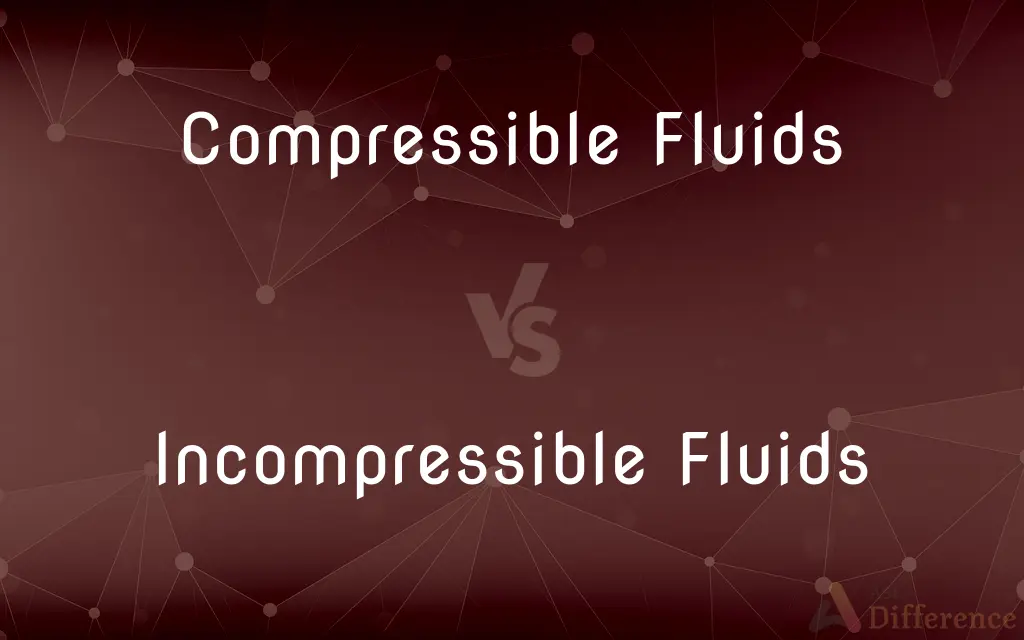Compressible Fluids vs. Incompressible Fluids — What's the Difference?
By Tayyaba Rehman — Published on December 28, 2023
Compressible Fluids can change volume under pressure; Incompressible Fluids maintain nearly constant volume.

Difference Between Compressible Fluids and Incompressible Fluids
Table of Contents
ADVERTISEMENT
Key Differences
Compressible Fluids, as the name suggests, are fluids whose volumes can change significantly when subjected to varying pressures. This means that when a certain force or pressure is applied to these fluids, their density can change. Gases, for instance, are the most common examples of Compressible Fluids. Under high pressure, gases can be compressed into smaller volumes, making them denser.
Incompressible Fluids, on the other hand, have volumes that change very little, even under significant pressure variations. These fluids have a nearly constant density regardless of the external forces acting upon them. Liquids, particularly water, are often categorized as Incompressible Fluids because their volume remains largely unchanged under typical conditions.
In engineering and fluid dynamics, understanding the compressibility of fluids is crucial. Compressible Fluids require different mathematical approaches when modeling their behavior, especially at high speeds or under significant pressure variations. As speed approaches the speed of sound, shock waves can form in Compressible Fluids, a phenomenon not seen in Incompressible Fluids.
Incompressible Fluids, with their consistent densities, simplify many fluid dynamics problems. Their behavior is predictable in various scenarios, and their incompressibility often allows for certain assumptions that streamline calculations. However, it's important to note that no fluid is truly incompressible; it's just that the volume change in some fluids, like water, is so minimal under normal conditions that they're treated as incompressible for practical purposes.
Comparison Chart
Volume Change under Pressure
Significant
Minimal
ADVERTISEMENT
Typical States of Matter
Often gases
Mostly liquids
Density Variation
Can vary widely
Remains nearly constant
Mathematical Modeling
Complex, especially at high speeds
Simplified due to near constant density
Examples
Air, hydrogen gas
Water, hydraulic oil
Compare with Definitions
Compressible Fluids
Compressible Fluids' properties can be altered based on their containment.
A gas cylinder holds Compressible Fluids at a density much higher than when they are at ambient conditions.
Incompressible Fluids
Incompressible Fluids simplify many fluid dynamics calculations.
Engineers often treat coolants in engines as Incompressible Fluids to streamline thermal analyses.
Compressible Fluids
Compressible Fluids display varying densities based on external forces.
The density of oxygen, a Compressible Fluid, changes in a pressurized tank compared to at atmospheric pressure.
Incompressible Fluids
Incompressible Fluids display minimal density changes under varying conditions.
The hydraulic oil used in car brakes, an Incompressible Fluid, transmits force effectively due to its consistent density.
Compressible Fluids
Compressible Fluids' behavior can change significantly at high velocities.
In aerodynamics, the Compressible Fluid nature of air leads to shock waves at near sonic speeds.
Incompressible Fluids
Incompressible Fluids are typically liquids in most conditions.
Mercury, an Incompressible Fluid, is used in barometers due to its stable volume under atmospheric changes.
Compressible Fluids
Compressible Fluids can change volume when exposed to varying pressures.
When air, a Compressible Fluid, is pumped into a tire, its volume decreases as pressure increases.
Incompressible Fluids
Incompressible Fluids have a nearly constant volume regardless of external pressures.
Water, an Incompressible Fluid, doesn't compress much even deep in the ocean.
Compressible Fluids
Compressible Fluids are mostly found in gaseous states.
Nitrogen, commonly used in food packaging, is a Compressible Fluid that can be stored under high pressure.
Incompressible Fluids
Incompressible Fluids are often used where volume constancy is vital.
In hydropower plants, the Incompressible Fluid nature of water is crucial for consistent energy generation.
Common Curiosities
Are liquids always Incompressible Fluids?
Mostly, but no fluid is truly incompressible. However, most liquids change volume so little they're treated as incompressible in many scenarios.
Why is compressibility important in aviation?
Understanding the compressible nature of air is crucial in aviation, especially at speeds approaching the sound barrier, where shock waves can form.
What defines Incompressible Fluids?
Incompressible Fluids have volumes that remain almost constant, even under significant pressure changes, typically observed in liquids.
How do Compressible Fluids behave under high velocities?
At high velocities, especially near the speed of sound, Compressible Fluids can exhibit phenomena like shock waves.
What are Compressible Fluids?
Compressible Fluids are those that can change volume under varying pressures, often seen in gases.
Are water and oil both examples of Incompressible Fluids?
Yes, both water and oil are typically treated as Incompressible Fluids in many engineering applications due to their minimal volume change under pressure.
Are all liquids Incompressible Fluids?
Most liquids are treated as Incompressible Fluids for practical purposes, though no fluid is truly incompressible.
Can Compressible Fluids turn into Incompressible Fluids?
Not inherently, but gases (Compressible Fluids) can condense into liquids (often treated as Incompressible Fluids) under certain conditions.
How does temperature affect Compressible Fluids?
Temperature changes can significantly affect the volume and density of Compressible Fluids, especially gases.
What happens to Incompressible Fluids under extreme pressures?
While Incompressible Fluids maintain nearly constant volume under typical pressures, extreme pressures can induce slight compressibility.
Do real-world applications treat water as an Incompressible Fluid?
In many applications, water is treated as an Incompressible Fluid due to its minimal volume change under typical conditions.
Can Incompressible Fluids be used in hydraulic systems?
Yes, Incompressible Fluids like hydraulic oil are ideal for systems that rely on consistent fluid volume for function.
How do engineers handle the compressibility of fluids in calculations?
Engineers use specific mathematical models for Compressible Fluids, especially at high speeds or pressures, while Incompressible Fluids allow for simplified assumptions in many scenarios.
Why are gases considered Compressible Fluids?
Gases are Compressible Fluids because their volume can change significantly under varying pressures.
Do Compressible Fluids have varying densities?
Yes, the density of Compressible Fluids can change with pressure and temperature variations.
Share Your Discovery

Previous Comparison
Membrane Potential vs. Equilibrium Potential
Next Comparison
Microsoft Office vs. LibreofficeAuthor Spotlight
Written by
Tayyaba RehmanTayyaba Rehman is a distinguished writer, currently serving as a primary contributor to askdifference.com. As a researcher in semantics and etymology, Tayyaba's passion for the complexity of languages and their distinctions has found a perfect home on the platform. Tayyaba delves into the intricacies of language, distinguishing between commonly confused words and phrases, thereby providing clarity for readers worldwide.
















































